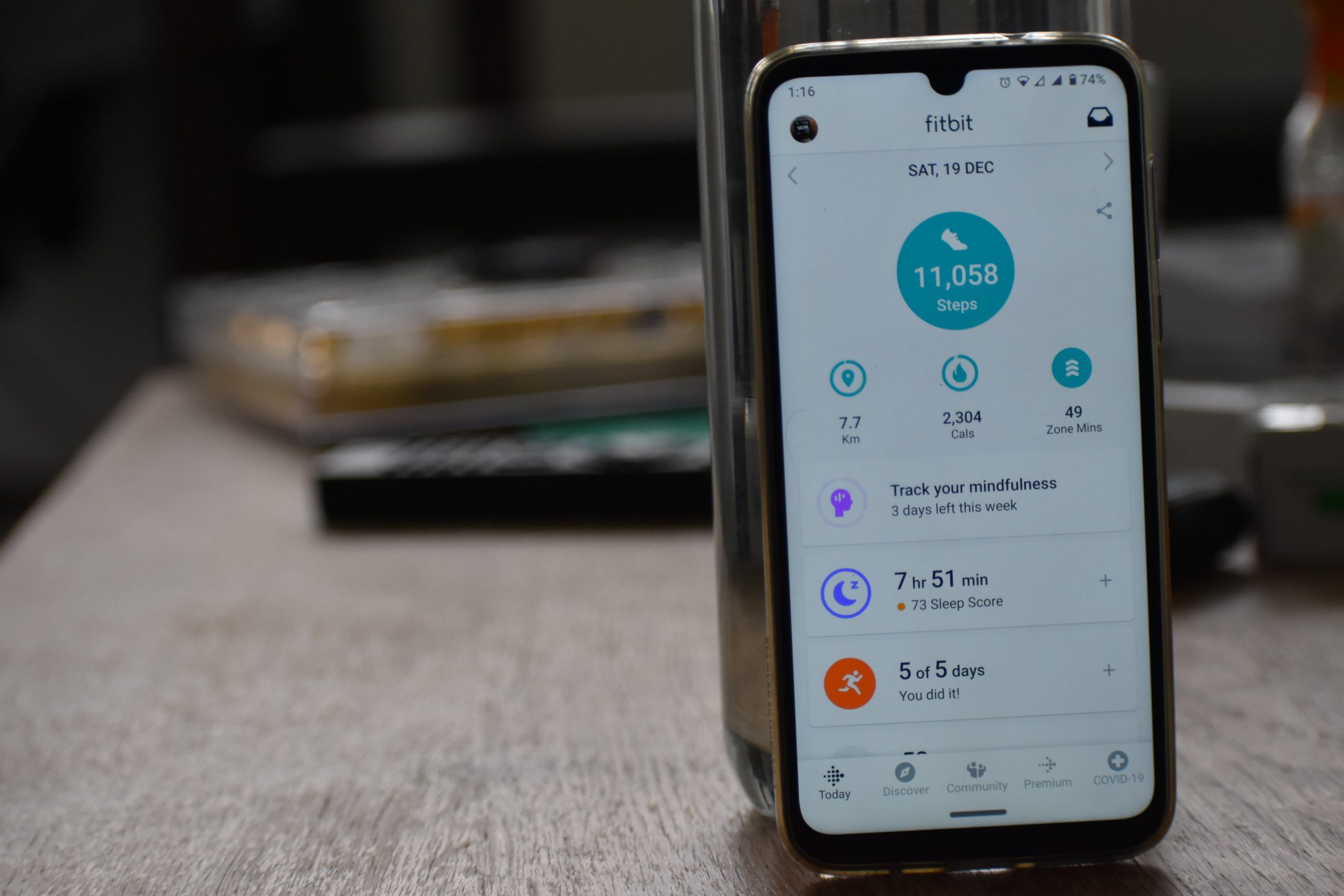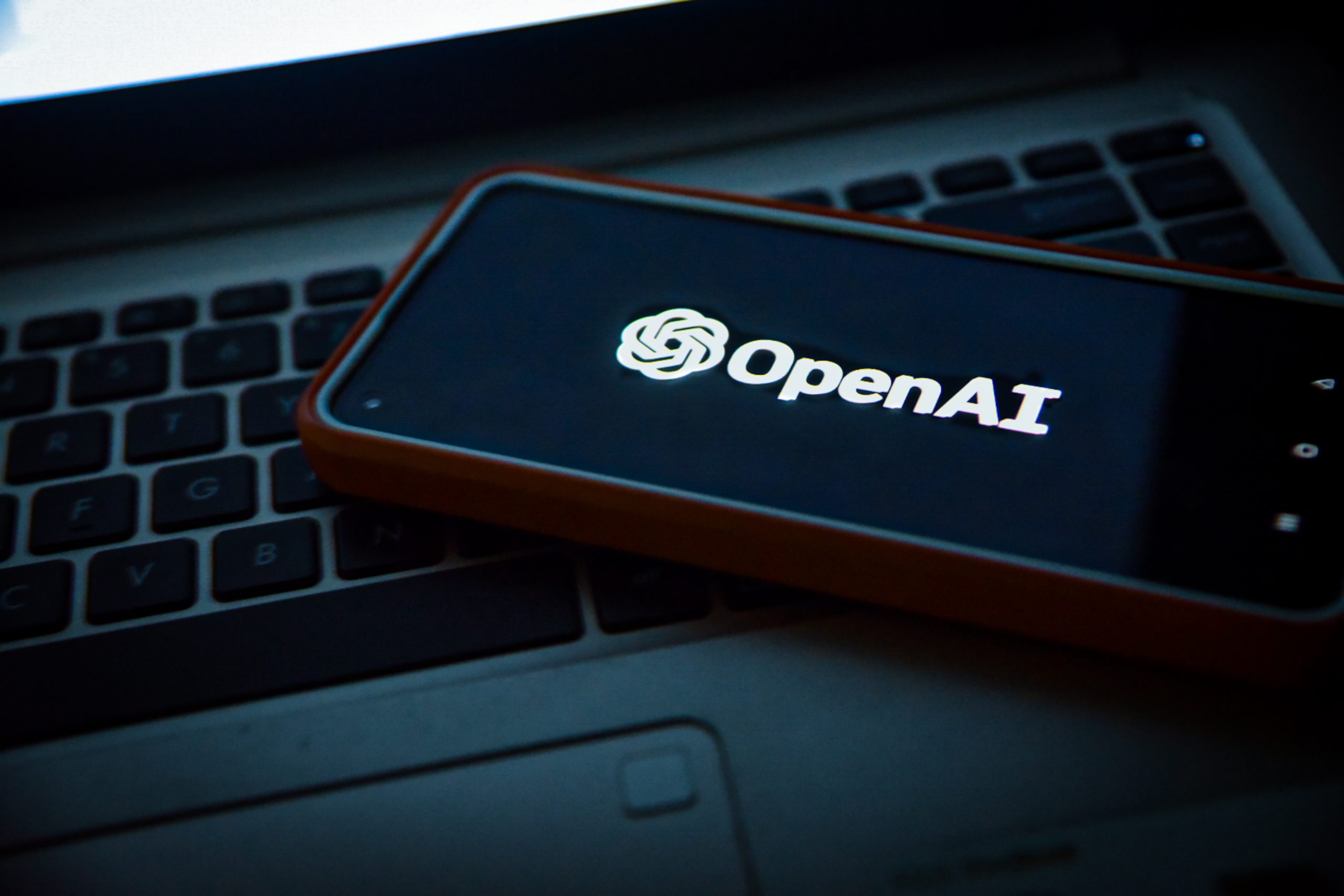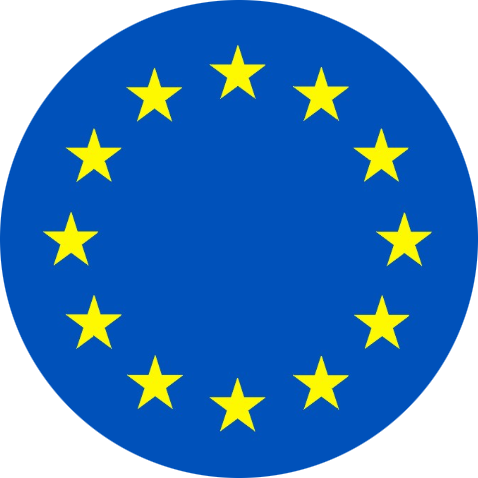Artificial intelligence (AI) is revolutionizing various industries, and healthcare is no exception. With advancements in technology, AI has become a driving force in improving healthcare applications. In this article, we will explore the intersection of AI and healthcare, the role of AI in different healthcare applications, the challenges and limitations it presents, and the future trends it holds. We at WeSoftYou, a software development company with a proven track record, believe that AI has the potential to reshape the healthcare landscape and enhance patient care.
Intersection of AI and Healthcare
Before delving into the role of AI in healthcare, it is essential to define what AI means in the context of healthcare. AI refers to the ability of machines to simulate human intelligence and perform tasks that typically require human intelligence, such as visual perception, speech recognition, and decision-making. In healthcare, AI algorithms analyze vast amounts of data to identify patterns, provide insights, and support clinical decision-making.
The need for AI in modern healthcare arises from the ever-growing volume of healthcare data and the complexity of medical knowledge. Traditional methods of manual analysis and interpretation have limitations in handling large datasets efficiently. AI algorithms can process and analyze data at a much faster pace, enabling healthcare professionals to make evidence-based decisions in real time.
One area where AI has shown significant promise is in medical imaging. With the help of AI algorithms, medical images such as X-rays, CT scans, and MRIs can be analyzed more accurately and efficiently. AI-powered image recognition algorithms can detect abnormalities or potential diseases that may be missed by human eyes. This not only improves the accuracy of diagnosis but also reduces the time taken to interpret medical images, allowing healthcare professionals to provide timely treatment.
Another area where AI is making a difference is in personalized medicine. AI algorithms can analyze a patient’s genetic information, medical history, and lifestyle factors to predict the risk of developing certain diseases or to determine the most effective treatment options. This level of personalized care can lead to better patient outcomes and improved healthcare resource allocation.
In addition to diagnosis and treatment, AI is also being used to enhance the efficiency of healthcare operations. AI-powered chatbots and virtual assistants can assist patients in scheduling appointments, answering common medical questions, and providing basic medical advice. This reduces the burden on healthcare staff and improves the overall patient experience.
Furthermore, AI can play a crucial role in drug discovery and development. By analyzing vast amounts of biomedical data, AI algorithms can identify potential drug targets, predict the efficacy of drug candidates, and optimize drug dosage regimens. This can significantly accelerate the drug discovery process, leading to the development of new treatments for various diseases.
However, it is important to note that the integration of AI in healthcare is not without challenges. Issues such as data privacy, algorithm bias, and ethical considerations need to be carefully addressed to ensure the responsible and effective use of AI in healthcare.
In conclusion, AI has the potential to revolutionize healthcare by improving diagnosis accuracy, personalizing treatment plans, enhancing healthcare operations, and accelerating drug discovery. As technology continues to advance, it is crucial for healthcare professionals and policymakers to embrace AI and work towards harnessing its full potential for the benefit of patients and the healthcare industry as a whole.
The Role of AI in Different Healthcare Apps
AI plays a crucial role in patient diagnosis and treatment. By leveraging machine learning algorithms, AI can analyze medical records, lab results, and imaging data to aid in diagnosing diseases accurately. This not only reduces the margin of error but also ensures timely interventions. AI algorithms can analyze patterns and predict outcomes, helping physicians determine the most effective treatment plans for individual patients.
Moreover, AI has revolutionized the field of medical research. With the ability to process and analyze vast amounts of data, AI algorithms can identify hidden patterns and correlations that may not be apparent to human researchers. This allows for the discovery of new treatment options and the development of personalized medicine. By combining AI with genomics, researchers can identify genetic markers that are associated with certain diseases, enabling early detection and targeted interventions.
In addition to diagnosis and treatment, AI is also making its mark in health monitoring and predictive analysis. Wearable devices and sensors capture vast amounts of patient data, such as heart rate, blood pressure, and glucose levels. AI algorithms can analyze this data in real time, alerting healthcare professionals to potential health risks and enabling preventive measures to be taken. This proactive approach can significantly improve patient outcomes and reduce hospital admissions.
Furthermore, AI has the potential to enhance the efficiency of healthcare systems. By automating administrative tasks, such as scheduling appointments and managing electronic health records, AI can free up healthcare professionals to focus on patient care. AI-powered chatbots and virtual assistants can also provide patients with immediate access to medical information and support, improving patient satisfaction and reducing the burden on healthcare providers.
Another area where AI is making a significant impact is in drug discovery and development. Traditional methods of drug discovery are time-consuming and costly. AI algorithms can analyze vast amounts of biological and chemical data to identify potential drug candidates, significantly speeding up the process. By simulating the effects of different compounds on the human body, AI can also predict the efficacy and safety of potential drugs, reducing the need for extensive animal testing.
Lastly, AI is playing a crucial role in improving healthcare accessibility and equity. Telemedicine, powered by AI, allows patients in remote areas to access healthcare services without the need for travel. AI-powered diagnostic tools can also help bridge the gap in healthcare access by providing accurate and affordable diagnoses in underserved communities. By democratizing healthcare, AI has the potential to improve health outcomes for all individuals, regardless of their geographical location or socioeconomic status.
Key AI Features in Healthcare Apps
Let’s delve into the key AI features that make healthcare apps more efficient and effective.
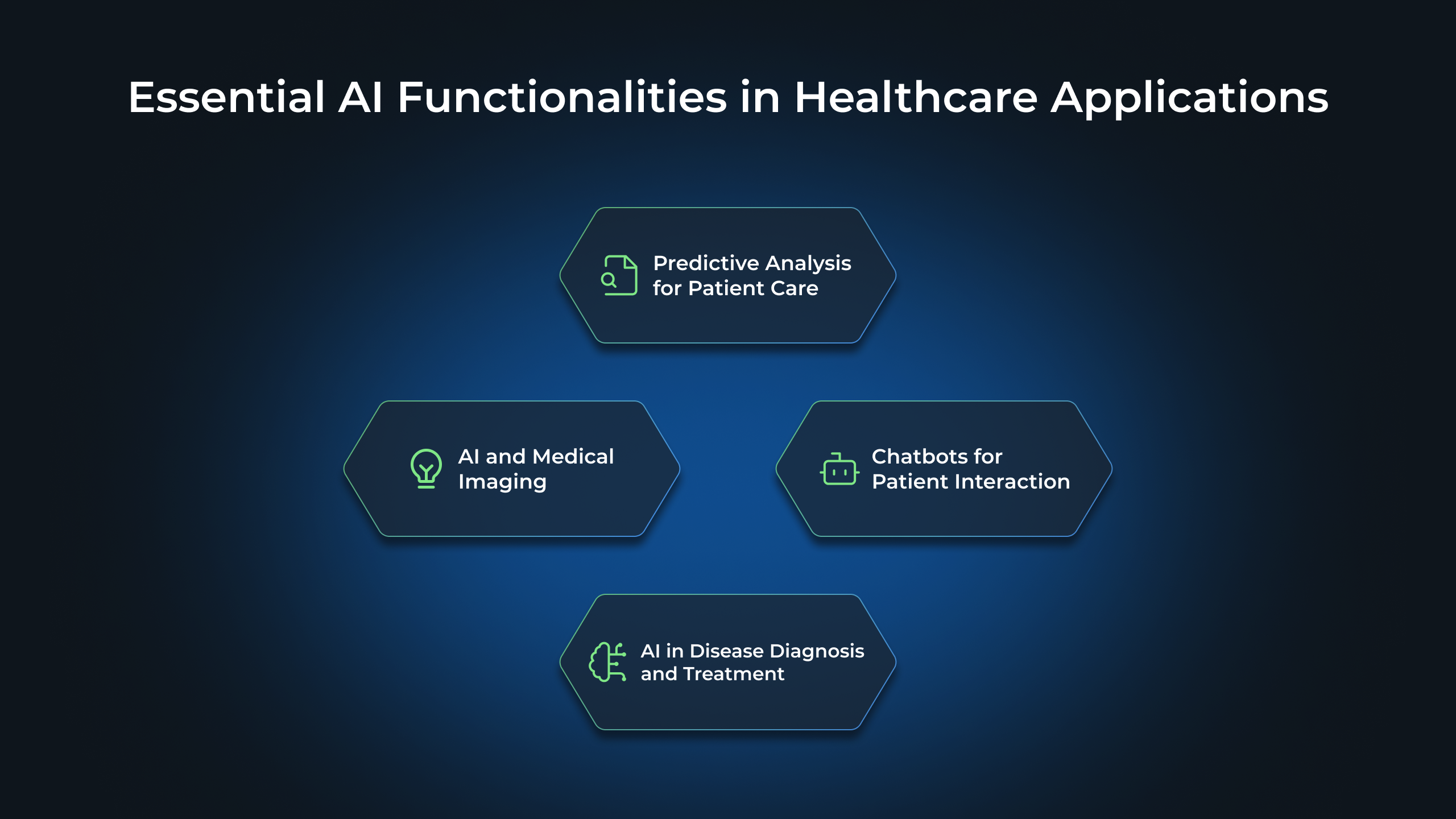
Artificial Intelligence (AI) has revolutionized the healthcare industry by introducing advanced features that enhance patient care, diagnostics, and overall efficiency. In this article, we will explore some of the key AI features in healthcare apps and their significant impact on the industry.
Predictive Analysis for Patient Care
Predictive analysis leverages AI algorithms to analyze large sets of patient data, identify trends, and predict potential health risks or outcomes. This empowers healthcare providers to proactively intervene and personalize patient care plans, resulting in better health outcomes.
By utilizing AI-powered predictive analysis, healthcare apps can monitor various factors such as vital signs, lifestyle habits, and medical history to identify patterns that may indicate the likelihood of certain health conditions. This early detection enables healthcare professionals to intervene promptly, preventing the progression of diseases and improving patient outcomes.
AI and Medical Imaging
Medical imaging is an integral part of healthcare diagnostics. AI-powered algorithms can analyze medical images, such as X-rays, MRIs, and CT scans, with remarkable accuracy. This not only speeds up the interpretation process but also improves diagnostic accuracy, leading to more effective treatments.
With AI, healthcare apps can analyze medical images in real-time, assisting radiologists and other medical professionals in identifying abnormalities or potential areas of concern. This technology helps reduce human error and enables healthcare providers to make more informed decisions regarding patient treatment plans.
Chatbots for Patient Interaction
Chatbots, powered by AI, are being deployed in healthcare apps to facilitate patient interaction and provide timely assistance. These virtual assistants can answer basic medical questions, schedule appointments, provide medication reminders, and even offer emotional support. By doing so, chatbots enhance convenience and accessibility in healthcare.
Through natural language processing and machine learning algorithms, chatbots can understand and respond to patient queries, providing accurate information and guidance. This feature not only saves time for healthcare professionals but also empowers patients to access healthcare services and information conveniently, especially in situations where immediate assistance is required.
AI in Disease Diagnosis and Treatment
AI algorithms have the potential to assist healthcare professionals in diagnosing diseases and recommending treatment options. By analyzing vast amounts of patient data, AI can identify patterns, detect anomalies, and provide insights that aid in making accurate diagnoses and selecting appropriate treatment plans.
Healthcare apps integrated with AI can analyze patient symptoms, medical history, and genetic information to generate personalized diagnoses and treatment recommendations. This technology enhances the accuracy and efficiency of disease identification, allowing healthcare providers to deliver targeted treatments and improve patient outcomes.
Furthermore, AI can continuously learn and adapt based on new data, enabling healthcare apps to stay updated with the latest medical research and advancements. This ensures that healthcare professionals have access to the most relevant and evidence-based information when making critical decisions.
In conclusion, AI features in healthcare apps have transformed the industry by enabling predictive analysis for patient care, improving medical imaging diagnostics, enhancing patient interaction through chatbots, and assisting in disease diagnosis and treatment. As technology continues to advance, we can expect further innovations in AI that will revolutionize healthcare and ultimately improve the well-being of patients worldwide.
Challenges and Limitations of AI in Healthcare Apps
While AI brings immense benefits to healthcare apps, it also presents challenges and limitations that need to be addressed. One of the primary concerns is data privacy and security.
With the abundance of sensitive patient information being processed and stored, strict measures must be implemented to safeguard patient privacy and prevent data breaches. This includes encryption techniques, secure storage systems, and access control mechanisms. As a software development company with expertise in healthcare app development, WeSoftYou understands the importance of secure data handling and can provide robust solutions.
Ethical considerations also come into play when deploying AI in healthcare. The use of AI algorithms in clinical decision-making raises questions about transparency and accountability.
Healthcare professionals must have a clear understanding of how AI arrives at its conclusions to ensure patient trust and confidence. This requires the development of explainable AI models that can provide insights into the decision-making process. Additionally, biases inherent in the data used to train AI systems can impact the fairness and accuracy of their outputs.
Developing algorithms that are free from bias is a complex task that requires ongoing research and development. It involves carefully curating diverse and representative datasets, as well as implementing bias detection and mitigation techniques. WeSoftYou is committed to staying at the forefront of AI research and development to address these challenges and ensure the ethical use of AI in healthcare.
Another limitation of AI in healthcare apps is the potential for overreliance on technology. While AI can assist healthcare professionals in making more accurate diagnoses and treatment plans, it should never replace human judgment and expertise.
Medical decisions involve complex factors that go beyond what AI algorithms can currently comprehend. Therefore, it is crucial to strike a balance between the use of AI and human involvement in healthcare. WeSoftYou recognizes the importance of human-centric design and works closely with healthcare professionals to develop AI-powered tools that enhance their capabilities rather than replace them.
In conclusion, while AI has the potential to revolutionize healthcare apps, it is essential to address the challenges and limitations it presents. By prioritizing data privacy and security, promoting transparency and accountability, mitigating biases, and maintaining a human-centric approach, WeSoftYou is dedicated to harnessing the power of AI in healthcare responsibly and ethically.
Future Trends of AI in Healthcare Apps
The future of AI in healthcare apps is promising, as new trends continue to emerge. With advancements in technology, AI is revolutionizing the healthcare industry and transforming the way we approach medical care.
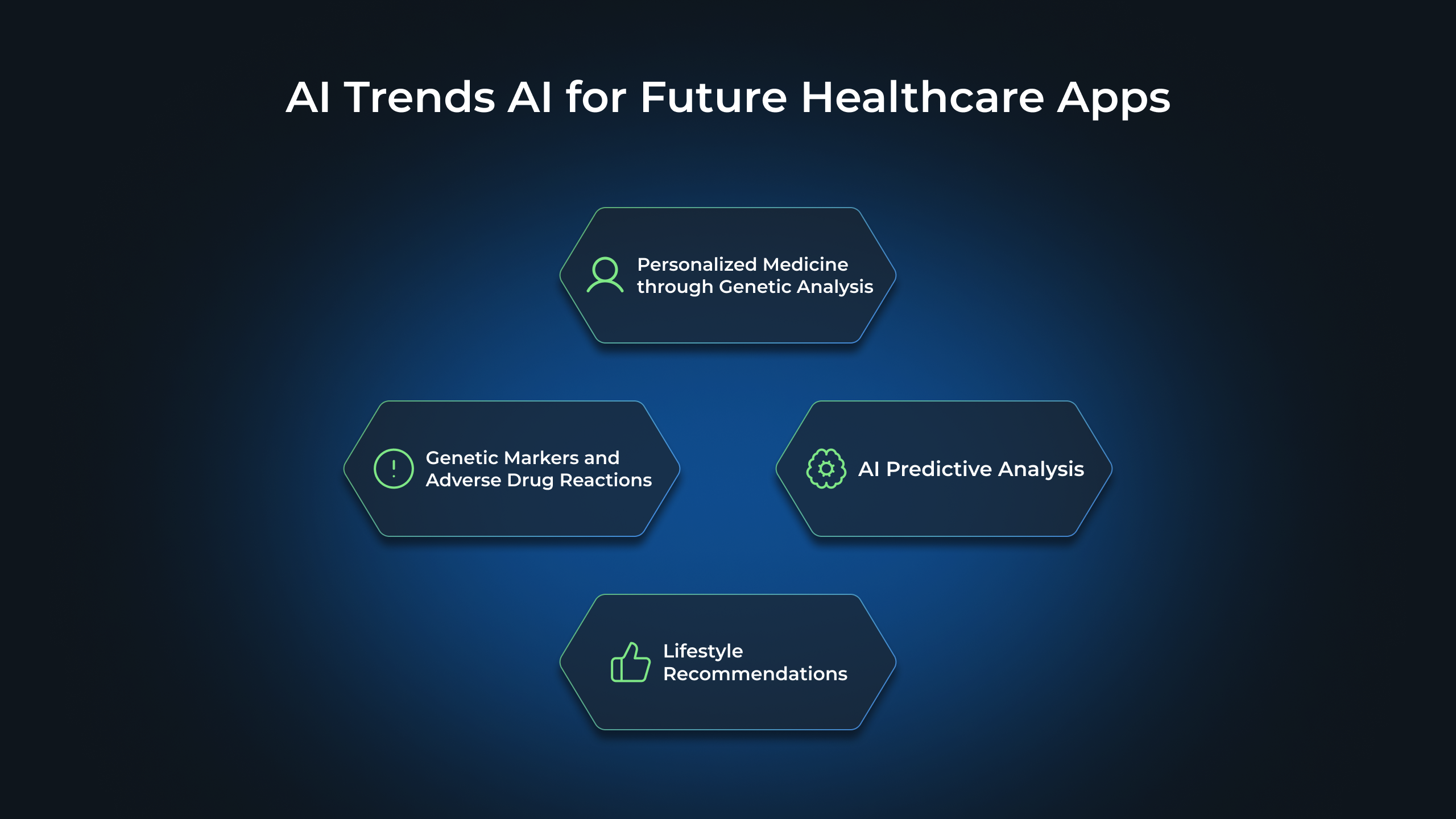
AI and Personalized Medicine
Personalized medicine, tailored to an individual’s unique genetic makeup, is gaining traction with the help of AI. By analyzing genetic and clinical data, AI algorithms help healthcare providers make informed decisions regarding disease prevention, diagnosis, and treatment, resulting in more targeted and effective interventions.
Imagine a world where doctors can use AI-powered tools to analyze a patient’s genetic information and identify specific genetic markers that may predispose them to certain diseases. Armed with this knowledge, healthcare providers can develop personalized treatment plans that take into account an individual’s genetic profile, increasing the chances of successful outcomes.
Furthermore, AI can also assist in the identification of potential adverse drug reactions based on a patient’s genetic makeup. By analyzing genetic data, AI algorithms can predict how an individual may respond to specific medications, allowing healthcare providers to prescribe drugs that are more likely to be effective and safe.
The Potential of AI in Telemedicine
Telemedicine has gained popularity, especially in remote areas. AI can further enhance telemedicine by enabling remote patient monitoring, virtual consultations, and efficient triaging. By leveraging AI features, healthcare providers can expand their reach and deliver quality care to patients who lack easy access to healthcare facilities.
Imagine a scenario where a patient living in a remote village can consult with a specialist located in a different city through a virtual platform. AI algorithms can assist in the diagnosis by analyzing the patient’s symptoms, medical history, and even images or scans. This not only saves time and money for the patient but also provides access to specialized care that would otherwise be difficult to obtain.
AI-powered remote patient monitoring systems can continuously collect and analyze patient data, such as vital signs, activity levels, and sleep patterns. This information can be used to detect early signs of deterioration or changes in health status, allowing healthcare providers to intervene promptly and prevent complications.
AI in Preventive Healthcare
Prevention is better than cure, and AI can play a significant role in preventive healthcare. With access to vast amounts of data, AI algorithms can identify high-risk populations, predict potential health issues, and recommend preventive measures. This proactive approach to healthcare has the potential to reduce the burden on healthcare systems and improve population health.
Imagine a future where AI algorithms analyze population-level data to identify trends and patterns that indicate an increased risk of certain diseases. By identifying these high-risk populations, healthcare providers can implement targeted interventions, such as public health campaigns or preventive screenings, to mitigate the impact of these diseases.
Furthermore, AI can also assist individuals in making healthier lifestyle choices. By analyzing personal health data, such as activity levels, sleep patterns, and dietary habits, AI algorithms can provide personalized recommendations for exercise routines, nutrition plans, and stress management techniques. This empowers individuals to take control of their health and make informed decisions that can prevent the onset of chronic diseases.
In conclusion, the future of AI in healthcare apps is filled with endless possibilities. From personalized medicine to telemedicine and preventive healthcare, AI has the potential to revolutionize the way we approach healthcare. By leveraging the power of AI algorithms and data analysis, healthcare providers can deliver more targeted, efficient, and personalized care, ultimately improving patient outcomes and population health.
Conclusion
AI for healthcare apps is transforming patient care by improving diagnosis, treatment, and prevention. As AI technology continues to advance, it is crucial for healthcare organizations to embrace its potential and address the challenges it presents. WeSoftYou, with our experience in software development and expertise in healthcare, is committed to partnering with healthcare providers to develop AI-powered solutions that enhance patient outcomes and revolutionize healthcare delivery.
FAQ
AI in health apps serves various purposes to enhance healthcare services. Some common uses include:
Diagnosis and Prediction: AI algorithms analyze medical data to assist in diagnosing conditions and predicting potential health issues.
Personalized Treatment Plans: AI tailors treatment plans based on individual patient data, optimizing care for specific health needs.
Remote Monitoring: AI enables real-time monitoring of patients, allowing healthcare providers to track vital signs and respond promptly to any anomalies.
Health Insights and Analytics: AI processes large datasets to derive valuable insights, aiding healthcare professionals in making informed decisions and improving overall health outcomes.
Chatbots for Patient Engagement: AI-powered chatbots offer immediate responses to patient queries, provide health information, and enhance patient engagement.
Drug Discovery: AI accelerates the drug discovery process by analyzing biological data, identifying potential drug candidates, and predicting their efficacy.
Administrative Efficiency: AI streamlines administrative tasks, such as appointment scheduling, billing, and data management, improving overall operational efficiency.
While AI offers great promise in healthcare, there are several challenges that need to be addressed. One major challenge is the need for high-quality and diverse data to train AI models effectively. Gathering and curating such data can be time-consuming and resource-intensive. Additionally, there are concerns about the interpretability and explainability of AI algorithms, as they often work as black boxes. Ensuring the ethical and responsible use of AI in healthcare is another challenge, as it involves issues such as privacy, bias, and accountability.
The integration of AI in healthcare raises important ethical considerations. One key concern is the potential for bias in AI algorithms, which can lead to disparities in healthcare outcomes among different populations. It is crucial to ensure that AI systems are trained on diverse and representative datasets to mitigate bias. Another ethical consideration is the responsibility and accountability for AI-driven decisions. As AI algorithms become more autonomous, it is essential to establish clear guidelines and mechanisms for monitoring and auditing their actions. Additionally, protecting patient privacy and obtaining informed consent for the use of AI in healthcare are important ethical considerations that must be addressed.
AI has emerged as a valuable tool in telemedicine and remote care, especially in situations where physical access to healthcare services is limited. Through AI-powered chatbots and virtual assistants, patients can receive immediate and accurate medical advice, reducing the need for in-person consultations. AI algorithms can analyze patient-generated data, such as vital signs and symptoms, to provide real-time monitoring and early detection of health issues. Furthermore, AI can assist in triaging patients, prioritizing those in need of urgent care. Overall, AI enhances the efficiency and accessibility of telemedicine, enabling healthcare professionals to remotely deliver high-quality care.
Have more questions or want to discuss your next healthcare app project? Contact us at WeSoftYou for a free consultation or project estimation.


